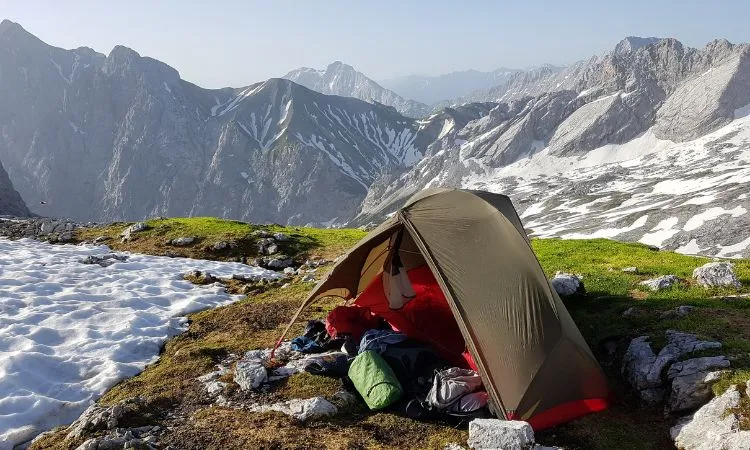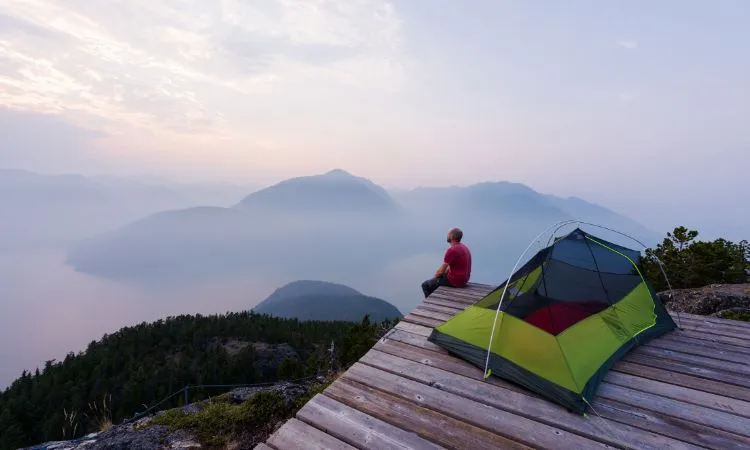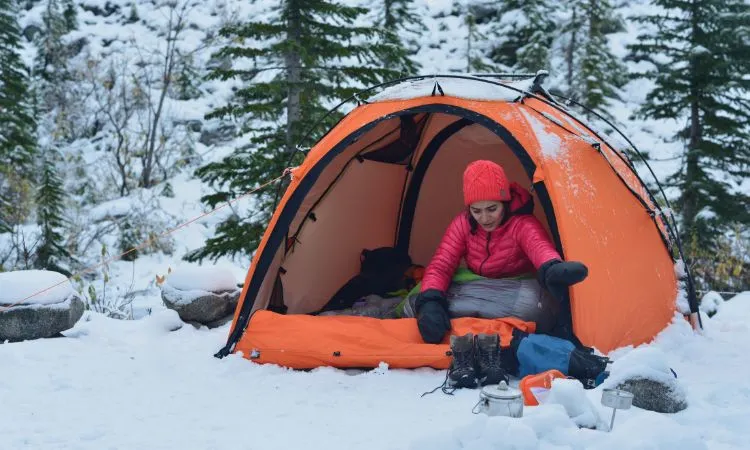In This Article
Hey there, adventure seekers! Ready to embark on a thrilling journey into the world of solo camping? Whether you’re a newbie looking to dip your toes into the wilderness or a seasoned pro seeking to refine your skills, this guide is packed with everything you need to know about solo camping. From essential gear to safety tips, we’ll cover it all. So, grab your backpack, and let’s dive into the exciting realm of solo adventures in the great outdoors!
The Allure of Solo Camping: Why Go It Alone?
Solo camping isn’t just about pitching a tent by yourself; it’s a transformative experience that can reshape your perspective on life and nature. When you’re out there alone, surrounded by nothing but the wilderness, you’ll discover a sense of freedom and self-reliance that’s hard to find anywhere else.
One of the biggest draws of solo camping is the opportunity for self-reflection. Without the distractions of daily life or the chatter of companions, you can truly connect with your thoughts and the natural world around you. It’s a chance to recharge your batteries, challenge yourself, and gain a deeper appreciation for the simple things in life. Plus, there’s something incredibly empowering about knowing you can survive and thrive on your own in the great outdoors.

Essential Gear for Your Solo Camping Adventure
When it comes to solo camping, having the right gear can make or break your experience. Here’s a list of must-have items to ensure your solo adventure is safe and comfortable:
- Tent: Choose a lightweight, easy-to-set-up tent that’s appropriate for the season and terrain.
- Sleeping bag and pad: Invest in quality sleep gear to stay warm and comfortable.
- Backpack: Get a well-fitting pack that can hold all your essentials.
- Water filtration system: Stay hydrated with clean water, no matter where you are.
- First aid kit: Be prepared for any minor injuries or ailments.
- Navigation tools: Bring a map, compass, and GPS device (with extra batteries).
- Multi-tool: A versatile tool for various camping tasks.
- Headlamp: Essential for nighttime visibility.
- Fire-starting materials: Matches, lighter, and fire starters.
- Emergency communication device: A satellite phone or personal locator beacon for remote areas.
Remember, when solo camping, you’ll be carrying all your gear yourself, so choose lightweight, compact options whenever possible. It’s also a good idea to test all your equipment before heading out on your solo adventure to ensure everything works properly and you know how to use it.
Must-read:
Planning Your Solo Camping Trip: Safety First
When it comes to solo camping, safety should always be your top priority. Here are some essential tips to keep in mind as you plan your adventure:
- Research your destination thoroughly: Know the terrain, weather conditions, and potential hazards.
- Share your itinerary: Let a trusted friend or family member know your plans, including expected return date.
- Check in regularly: Use predetermined check-in times to update your emergency contact.
- Know your limits: Choose a trip that matches your skill level and physical fitness.
- Be prepared for emergencies: Carry a well-stocked first aid kit and know basic wilderness first aid.
Remember, solo camping means you’re responsible for your own safety. It’s crucial to be honest with yourself about your abilities and to always err on the side of caution. If something doesn’t feel right, trust your instincts and don’t hesitate to change your plans or turn back if necessary.
Choosing the Perfect Solo Camping Spot
Finding the ideal spot for your solo camping adventure is crucial for both safety and enjoyment. Here are some factors to consider when selecting your campsite:
- Accessibility: Choose a location that matches your skill level and mode of transportation.
- Water source: Camp near a reliable water source, but not too close to avoid contamination and wildlife encounters.
- Terrain: Look for flat, dry ground for your tent, away from potential hazards like dead trees or flash flood areas.
- Wildlife: Research local wildlife and choose a spot that minimizes potential encounters.
- Regulations: Check local rules and obtain necessary permits for your chosen area.
When solo camping, it’s often best to stick to established campsites, especially if you’re just starting out. These areas are typically easier to access and offer some basic amenities. As you gain more experience, you might feel comfortable venturing into more remote backcountry locations. Always practice Leave No Trace principles to preserve the natural environment for future campers.

Solo Camping Cooking Tips: Fueling Your Adventure
When you’re solo camping, preparing meals can be both a challenge and a rewarding experience. Here are some tips to make your outdoor dining enjoyable and nutritious:
- Plan your meals in advance: Pack lightweight, high-energy foods that are easy to prepare.
- Bring a reliable camp stove: A small, portable stove is essential for hot meals and boiling water.
- Use one-pot recipes: Simplify your cooking and cleanup with meals that can be made in a single pot.
- Don’t forget snacks: Pack energy bars, nuts, and dried fruits for quick boosts during your activities.
- Stay hydrated: Bring a water filtration system and drink plenty of water throughout your trip.
Remember, when solo camping, you’ll need to carry all your food and cooking gear yourself. Opt for lightweight, compact options and consider using dehydrated meals for longer trips. Always store your food properly to avoid attracting wildlife to your campsite. With a little planning, you can enjoy delicious and satisfying meals even in the most remote locations.
Must-read:
- Protect Your Nomad Lifestyle: Essential Digital Nomad Insurance Coverage
- Solo Adventure Travel: Push Your Limits and Discover Yourself
Staying Safe While Solo Camping: Essential Tips
Safety is paramount when you’re out in the wilderness alone. Here are some crucial tips to keep in mind during your solo camping adventure:
- Trust your instincts: If a situation feels unsafe, remove yourself from it immediately.
- Be aware of your surroundings: Stay alert and pay attention to changes in weather or terrain.
- Know basic wilderness first aid: Take a course before your trip if possible.
- Carry emergency signaling devices: Whistles, mirrors, and bright clothing can help in case of emergencies.
- Avoid sharing your solo status: When encountering others, it’s often safer not to reveal that you’re alone.
Remember, solo camping means you’re solely responsible for your safety. It’s crucial to be prepared for various scenarios and to have a plan in place for emergencies. Always let someone know your itinerary and expected return date. While the solitude of solo camping can be incredibly rewarding, it’s important to balance that with smart safety practices.
Embracing Solitude: Mental Preparation for Solo Camping
Solo camping isn’t just about physical preparation; it’s also a mental game. Here are some tips to help you embrace and enjoy the solitude:
- Practice mindfulness: Use your time alone to be present and appreciate your surroundings.
- Bring entertainment: Pack a book, journal, or sketchpad for downtime activities.
- Set personal goals: Use your trip to challenge yourself or learn new skills.
- Prepare for loneliness: Understand that feeling lonely is normal and have strategies to cope.
- Enjoy the silence: Learn to appreciate the quiet and the sounds of nature around you.
Solo camping can be a powerful tool for personal growth and self-discovery. It’s an opportunity to disconnect from the noise of everyday life and reconnect with yourself and nature. Embrace the solitude as a chance to reflect, recharge, and gain a new perspective on life. Remember, it’s okay to feel a range of emotions during your solo trip – it’s all part of the experience.
Must-read:
- Best Adventure Travel Destinations: From Mountains to Oceans
- Learn a New Language Solo: Tips for Language Exchange and Immersion
Solo Camping for Beginners: Starting Small
If you’re new to solo camping, it’s best to start small and gradually build up your skills and confidence. Here are some tips for beginners:
- Start with car camping: Choose a campground with amenities for your first solo trip.
- Keep it short: Begin with one or two-night trips before attempting longer adventures.
- Practice at home: Set up your tent and test your gear in your backyard first.
- Join a group: Consider going on guided group trips to learn essential skills before going solo.
- Choose familiar terrain: Start with areas you’re already comfortable with or have visited before.
Remember, there’s no shame in starting small or taking it slow. Solo camping is all about personal growth and enjoyment, not proving anything to anyone else. As you gain experience and confidence, you can gradually increase the difficulty and duration of your trips. The most important thing is to stay safe and have fun while exploring the great outdoors on your own terms.

Advanced Solo Camping: Pushing Your Limits
For experienced solo campers looking to take their adventures to the next level, here are some ways to challenge yourself:
- Try winter camping: Learn the skills needed for cold weather camping and enjoy the solitude of snow-covered landscapes.
- Explore backcountry areas: Venture into more remote locations for a true wilderness experience.
- Extend your trips: Plan longer expeditions to really test your skills and endurance.
- Learn advanced skills: Master techniques like orienteering, wilderness first aid, or primitive fire-starting.
- Try ultralight camping: Challenge yourself to minimize your gear and pack weight.
As you push your limits with solo camping, always remember to prioritize safety. Make sure you have the necessary skills and equipment for more challenging trips. It’s also a good idea to gradually increase the difficulty of your adventures rather than making a huge leap. With experience and proper preparation, you can safely explore some of the most remote and beautiful corners of the wilderness.
Final Thoughts
Solo camping is an incredible journey of self-discovery and adventure. Whether you’re a beginner taking your first steps into the world of solo outdoor experiences or an expert looking to push your boundaries, there’s always something new to learn and explore. Remember, the key to successful solo camping lies in thorough preparation, respect for nature, and a positive mindset.
As you embark on your solo camping adventures, always prioritize safety, but don’t forget to embrace the joy and freedom that comes with being alone in nature. Challenge yourself, learn new skills, and most importantly, enjoy the unique experience of solo camping. So, pack your gear, choose your destination, and set out on your own personal wilderness adventure. The great outdoors is calling – are you ready to answer?
